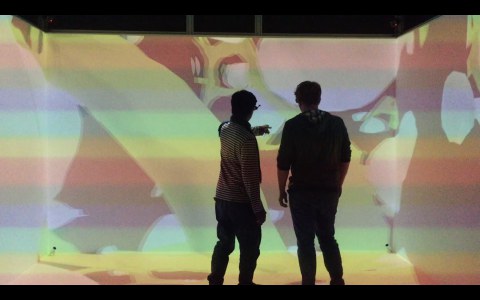Planned changes
For this course of study, changes are planned for the 2020/21 winter semester.
Table of contents
Admission requirements
The prerequisite for admission is a first higher education degree that has been recognised in Germany and that qualifies the student for entry into a profession; or a degree from a state or state-approved university of cooperative education in information technology, mathematics, natural sciences, economics or engineering.
In addition, English language skills at B2 level of the European Framework of Reference for Languages as well as special expertise in computer modelling are required.
Proof of the applicant’s particular suitability is provided by means of an aptitude assessment procedure in accordance with the Regulations for the Assessment of Suitability for the Master’s Programme in Computational Modeling and Simulation (Regulations for the Aptitude Assessment Procedure / Eignungsfeststellungsordnung) as amended.
Aptitude assessment procedure
The participation in an aptitude assessment or selection procedure is a prerequisite for enrollment in this degree program. Please note that the deadline for submitting an application may be earlier than the application deadlines for the degree program (see above under application deadlines). The following links will provide you with information on all documents to be submitted within the specified deadline and on the relevant regulations.
- Information and documents to be submitted
- Information on the aptitude assessment as well as the regulations for aptitude assessment can be found on the faculty’s website.
Notes on the application process
If, at the time of application, proof of the first degree qualifying the applicant for a profession is not yet available, the application will be considered under the precondition that 80% of the credit points attainable for the degree have already been achieved based on completed module examinations or the final thesis and the colloquium (if applicable). A certification from the awarding institute of higher education (examination office) serves as proof of the above-mentioned academic achievements. You can find the appropriate form on the Admissions Office website.
General information about the degree program
This curriculum teaches the computational and mathematical foundations of Computational Modeling and Simulation across applications. This includes both learning of models from data (Data Science, Machine Learning, Inference) as well as computer simulations of models. Specialization and knowledge transfer is acquired in the application-specific Tracks.
Study contents
The foundations in mathematics, computer science, and natural sciences with a strong emphasis on computer-based modeling and simulation form the prerequisites for application-specific specialization in one of the offered Tracks. The foundations include in particular: algorithmic and computatonal foundations, basic machine learning, data analysis, parallel programming, high-performance computing, numerical methods, probability and statistics, computer graphics and data visualization, stochastics, planning and analysis of computer experiments, and competence in literature studies in at least two application domains.
1. Track Computational Life Science:
Computer modeling of biochemical networks, applied bioinformatics, modeling and simulation of biological systems and processes in space and time, statistical methods and experiment design, validation and verification of simulation results, dynamics of and on biological networks, mathematical biology, computational biophysics, scientific visualization in biology and medicine, particle methods, simulation of reaction networks, computer models in cognitive neuroscience, simulation methods for tissue biomechanics.
2. Track Computational Mathematics:
Numerical analysis, numerically solving partial differential equations with finite element methods, scientific computing, computational methods in mathematical biology, mathematical modeling, numerics of partial differential equations, scientific programming, optimization methods, computational methods for multifield problems, computational statistics and Monte-Carlo methods.
3. Track Visual Computing:
Data visualization, algorithms for forward problems and inverse problems, user interface design, computer graphics, computer vision and image processing, information visualization, interactive media and multimedia, virtual reality, augmented reality, advanced machine learning and artificial intelligence.
4. Track Computational Modeling in Energy Economics (partly taught in German!):
Modeling and simulation of electricity markets, energy economy, simulation of national energy market systems, modeling environmental ressources and environment protection regulations, scientific computing, numerically solving partial differential equations.
5. Track Computational Engineering:
Computational fluid dynamics, simulation of multi-body dynamics, numerical methods for multifield problems, finite element methods for continuum mechanics, computer-aided design and optimization of technical systems.
6. Track Applied Artificial Intelligence:
Machine Learning, Machine Learning Hardware, Computer Vision, Computer Vision Optics and Electronics, Image Processing in Medicine, Robotics, Robotics in Medicine, Hardware-Software Co-design, Symbolic, Logic-based and Explainable Artificial Intelligence, Data Science, Databases or High-Performance Computing
Study documents
The official announcements of TU Dresden include all published regulations . Please use the search bar to find the document you need: Official proclamation
The regulations are also available on each institution’s website.
- Aptitude Assessment Regulation
- Examination Regulation
- Study Regulation
… you will find on the respective site of the responsible unit.
Contacts
Admissions Office
ServiceCenterStudies
Post address:
Technische Universität Dresden
Immatrikulationsamt
01062 Dresden
- Tel.
- +49 351 463-42000
Office Hours:
Faculty of Computer Science
Academic Advisor
(Track 1)
Mr. Prof. Dr. Ivo Sbalzarini
Academic Advisor
(Track 2)
Mr. Prof. Dr. Axel Voigt
Academic Advisor
(Track 3)
Mr. Prof. Dr. Stefan Gumhold
Academic Advisor
(Track 4)
Mr. Prof. Dr. Dominik Möst
Academic Advisor
(Track 5)
Mr. Prof. Dr. Wolf-Michael Beitelschmidt
Faculty of Mechanical Science and Engineering
Academic Advisor
(Track 6)
Mr. Prof. Björn Andres
International Office
International Office
Office address:
Bürogebäude Strehlener Str. (BSS) 22, 6. Etage, Raum 671
Post address:
TU Dresden
International Office
01062 Dresden
- Tel.
- +49 351 463-42000
Office Hours:

